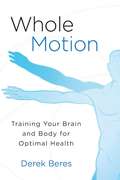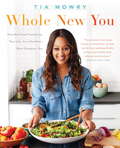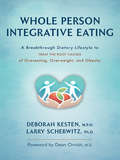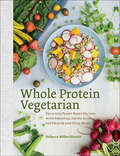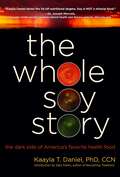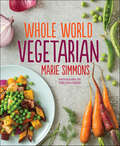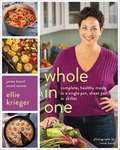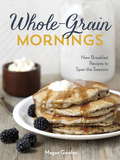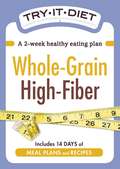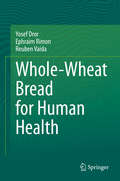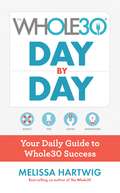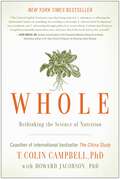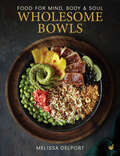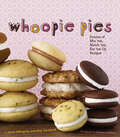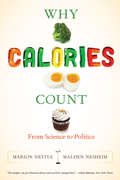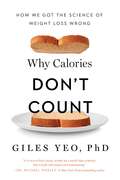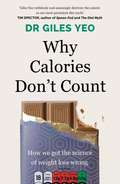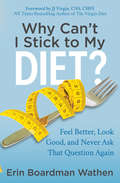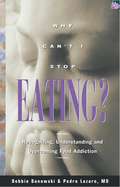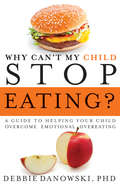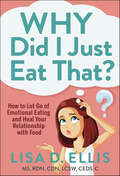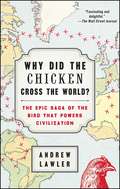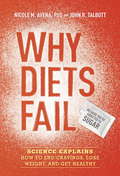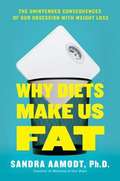- Table View
- List View
Whole Motion: Training Your Brain and Body for Optimal Health
by Derek BeresModern fitness is not just about how we move our bodies; it’s about how we move our brains as well. Whole Motion offers a complete picture of how to strengthen your resolve, gain laser-sharp focus, boost your ability to remember, calm your anxiety levels, master your emotional responses, and embody your body like never before. Author Derek Beres uncovers the latest research in how the brain is affected by a number of different exercise formats. The book offers sample workouts designed to give your brain the greatest stimulation and regeneration possible.Whole Motion is divided into two main sections. In the Movement section, Beres looks at the movement science and neuroscience behind Feldenkrais, strength training, HIIT, yoga, and meditation. He reveals the latest research behind each movement discipline and incorporates anecdotal examples from clients and students. He also includes information on when and why to perform each exercise.In the Mind section, Beres investigates the other side of fitness: nutrition, regeneration, flow, and disruption, as well as how to choose music for optimal workouts and the neurological cost of distraction. This section is the lifestyle component, focusing on how to create the best environment to achieve a sense of completeness in brain and body.
Whole New You: How Real Food Transforms Your Life, for a Healthier, More Gorgeous You
by Jessica Porter Tia MowryFrom the star of the Cooking Channel’s Tia Mowry at Home comes a timely clean-eating cookbook that will change the way you think about what you eat and jump-start your journey to a healthier, more gorgeous you. When actress Tia Mowry landed her breakthrough role on the sitcom Sister, Sister, she swapped home-cooked meals for catering spreads. But her teen-dream diet of candies and carbs turned into a nightmare when she developed endometriosis, a painful disease that affects one in ten women worldwide. Two years and two surgeries later, some surprising advice from her doctor inspired Tia to radically change one of the most basic elements of her life: her diet. After ditching the dairy and the refined sugars and processed foods, Tia’s pain receded drastically. What’s more, her migraines stopped, her skin cleared up, and she was finally able to get pregnant. Drawing on the latest research on whole plant foods, inflammation, and gut flora, Whole New You chronicles Tia’s journey to wellness and provides all the resources you need to feel better, including • a ten-day menu plan to begin your healthy life • more than 100 delicious recipes • lighter versions of your favorite comfort food recipes, including “Buttermilk” Fried Chicken and Crispy Collard Chips • healthy recipes for your kids • tips and tricks for eating on the go • complementary approaches, such as acupuncture and yoga, for whole body healing Like a trusted friend, Tia recounts both her setbacks and her triumphs—and shows you how to listen to what your body is telling you. With Whole New You, your healing begins now.
Whole Person Integrative Eating: A Breakthrough Dietary Lifestyle to Treat the Root Causes of Overeating, Overweight, and Obesity
by Larry Scherwitz Deborah Kesten M.P.HWinner of the 2020 Book Excellence Award in the Health Category A Holistic, Science-Backed Program to Help You Build a Healthier Relationship to Food, Eating and Weight! Do you suffer from chronic overeating and have concerns about your weight? Are you looking for a scientifically sound way of eating to prevent, even reverse, food-related chronic conditions, such as obesity, heart disease, depression and more? Are you ready to treat the root causes of being overweight and pave the way to a happier and healthier relationship to food, eating, and weight? This book is for you. Holistic nutrition researcher Deborah Kesten, M.P.H., and behavioral scientist Larry Scherwitz, Ph.D., offer documented proof that it is possible to overcome overeating and being overweight by nourishing yourself multi-dimensionally each time you eat. Combining ancient food wisdom with groundbreaking modern science, Whole Person Integrative Eating empowers you to discover the reasons you overeat and gain weight — while offering the Whole Person Integrative Eating (WPIE) antidotes: physical, emotional, spiritual and social nourishment. Through a powerful self-assessment quiz, you’ll identify your overeating styles, then build a personalized plan to create a new, healthy way of eating. Plus, you’ll discover 30 delicious recipes based on the Whole Person Integrative Eating program to jumpstart your optimal-eating efforts. Whole Person Integrative Eating is not a diet you will go on…and then off. It is a scientifically sound dietary lifestyle designed to be practiced for a lifetime. WPIE will inspire you to transform your relationship to food, eating, and weight by empowering you to discover true nourishment—physical, emotional, spiritual, and social—each time you eat…for life. What people are saying about Whole Person Integrative Eating: "Whole Person Integrative Eating is…a fascinating guide to choosing foods for health. It is a step-by-step plan to revolutionize your health." – Neal D. Barnard, M.D., Physicians Committee for Responsible Medicine “This evidence-based masterpiece not only educates but gives you an easy, precise strategy to experience sustainable freedom from the ravages of obesity." – David Reed Miloy, M.D., founder of Optimum Health: Partners in Wellness “This book is a pleasant reminder about how to realign with the joy of eating and good nourishment. [Whole Person Integrative Eating] offers both culturally and scientifically proven methods to re-establish healthy and enjoyable ways to relate to food again for those of us who have lost our way…In addition to delicious and nutrient-rich recipes…it turns out that how we eat is just as important as what we eat to maintain healthy bodies, happy minds. I highly recommend this book!” – Kathryn A., Reader, Customer Review, Amazon
Whole Protein Vegetarian: Delicious Plant-Based Recipes with Essential Amino Acids for Health and Well-Being
by Rebecca FfrenchA cookbook that takes the guesswork out of combining protein sources, to provide delicious, complete protein meals Are you afraid you won’t get enough protein—or the right kind—from a plant-based diet? Many grains, beans, leafy greens, and nuts contain fewer than all nine of the essential amino acids that comprise a complete, or “whole” protein, unlike animal-based proteins, which are more likely to be complete. This is an easy fix: Include a wide variety of plant-based foods over the course of a day and you’ll get the complementary proteins you need. These delicious recipes will get you started on the road to a healthy, plant-based diet.
Whole Soy Story: The Dark Side of America's Favorite Health Food
by Kaayla T. DanielA groundbreaking expose that tells the truth about soy that scientists know but that the soy industry has tried to suppress. Soy is not a health food, does not prevent disease and has not even been proven safe. Epidemiological, clinical and laboratory studies link soy to malnutrition, digestive problems, thyroid dysfunction, cognitive decline, reproductive disorders, even heart disease and cancer.
Whole World Vegetarian
by Marie SimmonsBig-flavored vegetarian dishes from around the globe, from the James Beard Award– and IACP Award–winning author Marie Simmons The best of our vegetarian recipes have always drawn inspiration from other cultures. In Whole World Vegetarian, Marie Simmons follows her culinary wanderlust, bringing together a collection of bold, imaginative dishes and seamlessly adapting them to contemporary tables.Cooks can expect a wealth of sumptuous options: rice- and corn-stuffed poblano chiles; Greek-style mac-and-cheese with summer squash; Indonesian vegetable salad with peanut dressing. Even the homiest dishes deliver rich rewards, like South American pumpkin–black bean stew with prunes. All have fresh twists: In a zucchini lasagna, squash replaces pasta, and a cold beet soup is replete with chopped fresh tomatoes, cucumbers, and apples. A Persian herb omelet gets an unexpected lift with baking powder. From a quick and little-known dip of Iranian yogurt, spinach, and caramelized onions garnished with toasted walnuts to shakshuka, a spicy Tunisian ratatouille crowned with poached eggs and fresh herbs, all become accessible and inviting under Simmons&’ guidance.
Whole in One: Complete, Healthy Meals in a Single Pot, Sheet Pan, or Skillet
by Ellie KriegerNew York Times bestselling author and James Beard Award winner Ellie Krieger gives her signature spin to the one-pot trend for meals that are nutritious, easy, and delicious.We want the food we love and we want to be healthy, but who has the time or energy to figure it all out? James Beard Award winner and bestselling cookbook author Ellie Krieger shows you how to create a meal in a single pot, sheet pan, baking dish, or skillet -- no additional gadgets or tools required. Divided by main ingredients -- meat, poultry, seafood, vegetarian, dessert -- and further separated into sheet pan, baking dish, skillet, and pot-cooked meals, the 125 nutritionally complete dinner recipes (plus healthy desserts) can each be prepared simply.Whole in One puts home-cooked meals within reach by minimizing the work load on both ends of the dinner process -- cooking and clean-up -- with one pot dishes that check every box. Minimal steps? Check. Crowd-pleasing flavors? Check. Easy-to-find ingredients? Check. Nutritionally complete? Check. Breezy cleanup? Check.
Whole-Grain Mornings
by Megan GordonA seasonal collection of enticing, comforting recipes for whole-grain breakfasts: cereals, granolas, porridges, and mueslis, as well as seasonal toppings and basics like homemade yogurt and almond milk, from the writer of the popular blog A Sweet Spoonful. A beautiful guide to morning meals, Whole-Grain Mornings offers sixty-five sweet and savory recipes for wholesome whole-grain breakfasts. Whether you're cooking for busy weekdays, slow Sundays, or celebratory brunches, this charming cookbook will inspire you to look beyond the average bowl of cereal toward healthy and delicious ways to incorporate whole grains like amaranth, farro, and barley into your morning meals. Seasonally organized recipes feature favorite one-bowl breakfast fare like Apricot Pistachio Granola and Triple-Coconut Quinoa Porridge alongside more unconventional options like Saucy Tomato Poached Eggs with Kale and Wheat Berries and Nutty Millet Breakfast Cookies. With information on timesaving alternatives as well as a guide to the most commonly used whole grains--and sprinkled with abundant food and lifestyle photography throughout--this cookbook guarantees the most important meal of the day will also become your favorite.
Whole-Grain, High Fiber: A two-week healthy eating plan (Try-It Diet)
by Adams MediaThink all diets have to be boring and bland? Think again. With Try-It Diet: Whole-Grain, High-Fiber, you’ll get a taste for the nutritional plan without having to give up great tasting food like Raspberry Almond Turnovers, Avocado Grapefruit Salad, and Penne Primavera. Now the information you need to start eating healthy and living fully is right at your fingertips. And with two weeks worth of original menus complete with easy-to-follow recipes, you’ll be able to stick to the plan without being stuck eating the same thing every day. Go ahead and give it a try!
Whole-Wheat Bread for Human Health
by Yosef Dror Ephraim Rimon Reuben VaidaThis book examines the effect of whole-wheat bread on health, with evidence linking the consumption of whole-wheat products to a decrease in the relative risk of non-communicable diseases in comparison with products baked from refined flour. The authors focus on key areas such as milling and refining procedures, bakery products, and assessment of the present consumption of wheat products. They offer a detailed description of all available ingredients of wheat-kernel, with particular attention paid to the health benefits of wheat-kernel antioxidants and dietary fiber ingredients. Vitamins, glutathione, choline and betaine, carotenoids, sterols and stanols are covered, and the book concludes with a general overview of the effect of whole-wheat bread on colon activity and immune capacity. Methods of improving bread nutritional quality, and the potential for the upgrading of the nutritional qualities of whole-bread, are also discussed. Consumption of whole-wheat in Western societies, however, has either not increased or increased very slightly. The authors intend for this book to highlight the health benefits of whole-wheat bread and the factors that contribute to these benefits.
Whole30 Day by Day
by Melissa HartwigTips, hacks, advice, and inspiration to help you achieve Whole30 success every day of the program The Whole30 Day by Day is the essential companion to the New York Times bestseller The Whole30; a daily handbook to keep you motivated, inspired, accountable, and engaged during your Whole30 journey. It's like having Whole30's own Melissa Hartwig coaching you through the Whole30 one day at a time, sharing a day-by-day timeline, personal motivation, community inspiration, habit hacks, and meal tips. Plus, each day offers guidance for self-reflection, food journaling, and tracking your non-scale victories to keep your momentum going and help you plan for the days to come. Whole30 Day by Day also serves as a quick-reference guide for the program: keeping the rules handy, sharing helpful resources, and walking you through the important reintroduction phase, one day at a time. You'll carry it everywhere during the program, using it to stay accountable and motivated during the 30 days, and letting the observations and reflections you record guide your food freedom plan long after your Whole30 is over.
Whole: Rethinking the Science of Nutrition
by T. Colin Campbell Howard JacobsonNew York Times Bestseller What happens when you eat an apple? The answer is vastly more complex than you imagine. Every apple contains thousands of antioxidants whose names, beyond a few like vitamin C, are unfamiliar to us, and each of these powerful chemicals has the potential to play an important role in supporting our health. They impact thousands upon thousands of metabolic reactions inside the human body. But calculating the specific influence of each of these chemicals isn't nearly sufficient to explain the effect of the apple as a whole. Because almost every chemical can affect every other chemical, there is an almost infinite number of possible biological consequences. And that's just from an apple. Nutritional science, long stuck in a reductionist mindset, is at the cusp of a revolution. The traditional &“gold standard" of nutrition research has been to study one chemical at a time in an attempt to determine its particular impact on the human body. These sorts of studies are helpful to food companies trying to prove there is a chemical in milk or pre-packaged dinners that is &“good" for us, but they provide little insight into the complexity of what actually happens in our bodies or how those chemicals contribute to our health. In The China Study, T. Colin Campbell (alongside his son, Thomas M. Campbell) revolutionized the way we think about our food with the evidence that a whole food, plant-based diet is the healthiest way to eat. Now, in Whole, he explains the science behind that evidence, the ways our current scientific paradigm ignores the fascinating complexity of the human body, and why, if we have such overwhelming evidence that everything we think we know about nutrition is wrong, our eating habits haven't changed. Whole is an eye-opening, paradigm-changing journey through cutting-edge thinking on nutrition, a scientific tour de force with powerful implications for our health and for our world.
Wholesome Bowls: Food for mind, body and soul
by Melissa DelportAll the whole food nourishment you need in one bowl! Wholesome Bowls are the delicious answer to eating mindfully and well.The nearly 90 recipes included in this book are packed with nourishment, providing healthy, balanced and easy meals in a bowl. Many of the recipes are vegan or vegetarian, or can easily be adapted to suit either lifestyle choice. But there is plenty for the meat-eater too, with the added bonus that not only does the food look inviting and uplifting for the soul, it&’s good for your body too. There are also snippets of information about some of the ingredients to inform your food choices and why eating fresh, whole foods will benefit you.Try Turkish Eggs with Spicy Sesame Drizzle for brunch, a Brussels Sprouts, Pear and Horseradish bowl for lunch, and a warming Roasted Celeriac and Mushroom soup or a Chicken Fajita bowl for dinner. For something sweet there's Vegan Sweet Potato and Chilli Brownie bowl or Spice Cake with Cashew Cream Cheese Frosting. Wholesome Bowls is all about healing your relationship with food. Food is not the enemy and neither is your body. Taking the time to get to know your body, treating it with respect and nourishing it with real, fresh food is the single most important thing you can do for yourself. Eating mindfully, cutting out processed foods and embracing the foods that fuel you and leave you feeling energized are all part of the journey to finding happiness with food.
Whoopie Pies: Dozens Of Mix `em, Match `em, Eat `em Up Recipes
by Amy Treadwell Sarah Billingsley“Their book delivers more than (marshmallow) fluff. Their recipes offer new ideas for mixing and matching flavors and fillings.” —Tasting TableIs it a cake? Is it a cookie? With such deliciously soft and sweet cream-filled snacks, does it matter? The Internet is abuzz with recipes and stories of whoopie pie folklore, while customers everywhere are descending on bakeries in droves demanding these delectable treats. This adorable volume—the only cookbook devoted entirely to whoopie pies—features more than 40 mix-and-match recipes, including the classic chocolate with marshmallow cream and a range of bright flavor combinations such as red velvet, green tea, pumpkin with a tangy cream cheese filling, and oatmeal with, yes, maple-bacon buttercream. With plenty of color photos and hand-drawn illustrations, dozens of DIY decorating instructions, fun facts and baking tips, Whoopie Pies will make a welcome addition to any baker’s bookshelf.“Authors Sarah Billingsley and Amy Treadwell provide you with all the tools necessary to whip up a batch (or two, or three . . . ) of a variety of whoopie pies that will pretty much guarantee your addiction to these retro treats.” —CookThatBook“Sarah Billingsley and Amy Treadwell give us a gourmet take on whoopie pies—without sacrificing any of the decadence or childlike delight!” —Errant Dreams“The book offers some general tidbits on making, storing and freezing whoopie pies as well as some fun facts . . . I was surprised at how easy these are to make and how tasty even my results were.” —EverythingMom
Why Calories Count: From Science to Politics (California Studies in Food and Culture #33)
by Marion Nestle Malden NesheimCalories--too few or too many--are the source of health problems affecting billions of people in today's globalized world. Although calories are essential to human health and survival, they cannot be seen, smelled, or tasted. They are also hard to understand. In Why Calories Count, Marion Nestle and Malden Nesheim explain in clear and accessible language what calories are and how they work, both biologically and politically. As they take readers through the issues that are fundamental to our understanding of diet and food, weight gain, loss, and obesity, Nestle and Nesheim sort through a great deal of the misinformation put forth by food manufacturers and diet program promoters. They elucidate the political stakes and show how federal and corporate policies have come together to create an "eat more" environment. Finally, having armed readers with the necessary information to interpret food labels, evaluate diet claims, and understand evidence as presented in popular media, the authors offer some candid advice: Get organized. Eat less. Eat better. Move more. Get political.
Why Calories Don't Count: How We Got the Science of Weight Loss Wrong
by Ph.D. Giles YeoA Cambridge obesity researcher upends everything we thought we knew about calories and calorie-counting.Calorie information is ubiquitous. On packaged food, restaurant menus, and online recipes we see authoritative numbers that tell us the calorie count of what we're about to consume. And we treat these numbers as gospel—counting, cutting, intermittently consuming and, if you believe some 'experts' out there, magically making them disappear. We all know, and governments advise, that losing weight is just a matter of burning more calories than we consume. But it's actually all wrong. In Why Calories Don't Count, Dr. Giles Yeo, an obesity researcher at Cambridge University, challenges the conventional model and demonstrates that all calories are not created equal. He addresses why popular diets succeed, at least in the short term, and why they ultimately fail, and what your environment has to do with your bodyweight. Once you understand that calories don't count, you can begin to make different decisions about how you choose to eat, learning what you really need to be counting instead. Practical, science-based and full of illuminating anecdotes, this is the most entertaining dietary advice you'll ever read.
Why Calories Don't Count: How we got the science of weight loss wrong
by Dr Giles Yeo'In this great read, Giles Yeo ruthlessly and amusingly destroys the calorie as our most persistent diet myth.' Tim Spector, author of Spoon-Fed and The Diet Myth'A tour de force by the wise and witty Professor Giles Yeo. As well as being one of the UK's foremost experts on the genetics of obesity, Professor Yeo knows how to tell a great story. After reading this brilliant book you will understand what the labels on food really tell us, and what they don't.' Michael Mosley, author of The Fast 800'Giles Yeo knows that when it comes to motivating us to make better food choices, a little understanding goes a long way. He writes with a gift for making the science of diet interesting and a knack for telling us just what we need to know, and not too much more. Here he takes on the demon calories, and shows us why we should neither fear them, nor worship them, and certainly not count them. It's a book that will help you not just to eat better, but to enjoy eating better. And that's got to be worth having on your kitchen shelf.' Hugh Fearnley-WhittingstallCalorie information is ubiquitous. On packaged food, restaurant menus and online recipes we see authoritative numbers that tell us the calorie count of what we're about to consume. And we treat these numbers as gospel; counting, cutting, intermittently consuming and, if you believe some 'experts' out there, magically making them disappear. We all know, and governments advise, that losing weight is just a matter of burning more calories than we consume.Here's the thing, however, that most people have no idea about. ALL of the calorie counts that you see everywhere today, are WRONG.In Why Calories Don't Count Dr Giles Yeo, obesity researcher at Cambridge University, challenges the conventional model and demonstrates that all calories are not created equal. He addresses why popular diets succeed, at least in the short term, and why they ultimately fail, and what your environment has to do with your bodyweight.Once you understand that calories don't count, you can begin to make different decisions about how you choose to eat, learning what you really need to be counting instead. Practical, science-based and full of illuminating anecdotes, this is the most entertaining dietary advice you'll ever read.
Why Calories Don't Count: How we got the science of weight loss wrong
by Giles Yeo'In this great read, Giles Yeo ruthlessly and amusingly destroys the calorie as our most persistent diet myth.' Tim Spector, author of Spoon-Fed and The Diet Myth'A tour de force by the wise and witty Professor Giles Yeo. As well as being one of the UK's foremost experts on the genetics of obesity, Professor Yeo knows how to tell a great story. After reading this brilliant book you will understand what the labels on food really tell us, and what they don't.' Michael Mosley, author of The Fast 800'Giles Yeo knows that when it comes to motivating us to make better food choices, a little understanding goes a long way. He writes with a gift for making the science of diet interesting and a knack for telling us just what we need to know, and not too much more. Here he takes on the demon calories, and shows us why we should neither fear them, nor worship them, and certainly not count them. It's a book that will help you not just to eat better, but to enjoy eating better. And that's got to be worth having on your kitchen shelf.' Hugh Fearnley-WhittingstallCalorie information is ubiquitous. On packaged food, restaurant menus and online recipes we see authoritative numbers that tell us the calorie count of what we're about to consume. And we treat these numbers as gospel; counting, cutting, intermittently consuming and, if you believe some 'experts' out there, magically making them disappear. We all know, and governments advise, that losing weight is just a matter of burning more calories than we consume.Here's the thing, however, that most people have no idea about. ALL of the calorie counts that you see everywhere today, are WRONG.In Why Calories Don't Count Dr Giles Yeo, obesity researcher at Cambridge University, challenges the conventional model and demonstrates that all calories are not created equal. He addresses why popular diets succeed, at least in the short term, and why they ultimately fail, and what your environment has to do with your bodyweight.Once you understand that calories don't count, you can begin to make different decisions about how you choose to eat, learning what you really need to be counting instead. Practical, science-based and full of illuminating anecdotes, this is the most entertaining dietary advice you'll ever read.
Why Can't I Stick to My Diet?: Feel Better, Look Good, and Never Ask That Question Again
by Erin Boardman WathenLearn a smarter way to resist temptation with this wise, witty guide to healthier eating habits! Falling off of our diets happens to the best of us—but it doesn&’t have to happen to you again. It isn&’t a moral issue or a matter of willpower. It&’s based on science, and there is a solution. In this book, you&’ll learn: Why diets are so hard to stick toWhat is preventing us from sticking to our dietsWhy not being on a diet is the most effective way to maintain weight lossHow to figure out a specialized food plan for the rest of your lifeHow to ditch the diet mentality for good As a holistic health coach, food addiction counselor, Spin teacher, and wellness blogger, Erin Boardman Wathen has both the professional and personal experience to guide you to a better way, in a book that combines self-deprecating wit and the tough love of a good girlfriend. She will finally explain why those donuts are calling your name at the morning staff meeting—and why you need to tell them &“Not today, little balls of Satan!&”
Why Can't I Stop Eating: Recognizing, Understanding, and Overcoming Food Addiction
by Debbie Danowski Pedro LazaroThis straight-talking book puts the widespread problem of food addiction into clear perspective and points the way to a life free of the obsession with food.Why can't I stop eating? If, like millions of others, you often ask yourself this question, you may be addicted to food. The food you eat may be precisely what makes you crave more...and more. This straight-talking book puts the widespread problem of food addiction into clear perspective and points the way to a life free of the obsession with food. Debbie Danowski, whose food addiction nearly ruined her life, and Peter Lazaro combine forces to give readers a full understanding of this debilitating condition: its sources, patterns, consequences, and physiological underpinnings. Unlike fad diets and drugs with their side effects, hidden costs, and infamous failure rates, the program outlined in this book goes to the root cause of chronic overeating and puts the tools for a lifelong cure into the hands of anyone willing to accept responsibility for a healthy, happy future.
Why Can't My Child Stop Eating?
by Debbie DanowskiHelp for parents that tackles the real causes of childhood obesity and offers practical solutions. Why Can't My Child Stop Eating examines the emotional roots of overeating and addresses the social, emotional, and physical problems of these children and their families.With the ever-growing childhood obesity problem, the audience for this book continues to develop. Why Can't My Child Stop Eating? provides parents with specific activities to assist in addressing and healing the emotional aspects of obesity. Currently there is no book on the market that provides assistance in coping with the emotional issues of obesity that offers an emotional recovery plan for children.Debbie Danowski, PhD, is co-author of the previously published Why Can't I Stop Eating? (Hazelden Publishing, 2000), in which she outlined her personal physical, emotional, and spiritual food addiction recovery program that resulted in her losing more than 150 pounds over seventeen years ago. She is a regular guest on both national and international radio programs. Why Can't I Stop Eating? was Hazelden's best-selling trade book in the summer of 2000. The book is currently in its third printing.
Why Did I Just Eat That?: How to Let Go of Emotional Eating and Heal Your Relationship with Food
by Lisa D. EllisGet off the diet roller coaster and embark on a life-affirming journey towards a positive and sustainable relationship with food and your body.In Why Did I Just Eat That? Registered Dietitian, Certified Eating Disorders Specialist, and food therapist Lisa D. Ellis offers nutritional and therapeutic support in this comprehensive guide to healthy eating. She promotes an all-foods-fit model and mindfulness to explain the connection between human emotions, habits, and physical satisfaction. She rejects the toxic constraints of diet culture and instead encourages self-acceptance, eating intuitively, and fundamentally redefining our relationship with food.Why Did I Just Eat That? begins with removing the blame and shame associated with food by sharing a highly readable overview of how early human survival strategies influence our eating issues today. A self-administered quiz follows, designed to identify the specific types of eating behaviors. Finally, after real case studies and solutions are discussed, Why Did I Just Eat That? provides practical and achievable healing steps tailored to address the needs of each respective type of eater.The science-backed wisdom, exercises, and activities will empower anyone struggling with food to let go of the idea of perfection and define their relationship with food on their own terms, paving the way for deeper self-discovery and a healthier way of living.
Why Did the Chicken Cross the World?
by Andrew LawlerFrom ancient empires to modern economics, veteran journalist Andrew Lawler delivers a sweeping history of the animal that has been most crucial to the spread of civilization across the globe--the chicken.Queen Victoria was obsessed with it. Socrates' last words were about it. Charles Darwin and Louis Pasteur made their scientific breakthroughs using it. Catholic popes, African shamans, Chinese philosophers, and Muslim mystics praised it. Throughout the history of civilization, humans have embraced it in every form imaginable--as a messenger of the gods, powerful sex symbol, gambling aid, emblem of resurrection, all-purpose medicine, handy research tool, inspiration for bravery, epitome of evil, and, of course, as the star of the world's most famous joke. In Why Did the Chicken Cross the World?, science writer Andrew Lawler takes us on an adventure from prehistory to the modern era with a fascinating account of the partnership between human and chicken (the most successful of all cross-species relationships). Beginning with the recent discovery in Montana that the chicken's unlikely ancestor is T. rex, this book builds on Lawler's popular Smithsonian cover article, "How the Chicken Conquered the World" to track the chicken from its original domestication in the jungles of Southeast Asia some 10,000 years ago to postwar America, where it became the most engineered of animals, to the uncertain future of what is now humanity's single most important source of protein. In a masterful combination of historical sleuthing and journalistic exploration on four continents, Lawler reframes the way we feel and think about our most important animal partner--and, by extension, all domesticated animals, and even nature itself. Lawler's narrative reveals the secrets behind the chicken's transformation from a shy jungle bird into an animal of astonishing versatility, capable of serving our species' changing needs. For no other siren has called humans to rise, shine, and prosper quite like the rooster's cry: "cock-a-doodle-doo!"
Why Diets Fail (Because You're Addicted to Sugar)
by John R. Talbott Nicole M. AvenaA food addiction expert reveals definitive proof that sugar is addictive, and presents the first science-based plan to cut out the sugar, stop the cravings that cause most diets to eventually fail, and lose weight--permanently. Most diets work for a while...but there usually comes a point when the dieter can't maintain the strict dietary changes required to lose additional pounds or keep the weight off. Why? Because cravings take over and, as with cigarettes or drugs, the pull becomes too strong to resist. In Why Diets Fail, Dr. Nicole M. Avena explains that sugar addiction underlies those cravings and shares a revolutionary plan for going sugar-free and sticking to the diet during the make-or-break withdrawal period. Dr. Avena's easy-to-use sugar table expresses the amount of sugar in 600+ common foods so dieters know precisely what to eat and what to avoid, and co-author John Talbott shares his personal story (and tips for success) about quitting sugar and losing 50 pounds along with his cravings for nicotine and alcohol.
Why Diets Make Us Fat: The Unintended Consequences of Our Obsession With Weight Loss
by Sandra Aamodt"If diets worked, we'd all be thin by now. Instead, we have enlisted hundreds of millions of people into a war we can't win." What's the secret to losing weight? If you're like most of us, you've tried cutting calories, sipping weird smoothies, avoiding fats, and swapping out sugar for Splenda. The real secret is that all of those things are likely to make you weigh more in a few years, not less. In fact, a good predictor of who will gain weight is who says they plan to lose some. Last year, 108 million Americans went on diets, to the applause of doctors, family, and friends. But long-term studies of dieters consistently find that they're more likely to end up gaining weight in the next two to fifteen years than people who don't diet. Neuroscientist Sandra Aamodt spent three decades in her own punishing cycle of starving and regaining before turning her scientific eye to the research on weight and health. What she found defies the conventional wisdom about dieting: ·Telling children that they're overweight makes them more likely to gain weight over the next few years. Weight shaming has the same effect on adults. ·The calories you absorb from a slice of pizza depend on your genes and on your gut bacteria. So does the number of calories you're burning right now. ·Most people who lose a lot of weight suffer from obsessive thoughts, binge eating, depression, and anxiety. They also burn less energy and find eating much more rewarding than it was before they lost weight. ·Fighting against your body's set point--a central tenet of most diet plans--is exhausting, psychologically damaging, and ultimately counterproductive. If dieting makes us fat, what should we do instead to stay healthy and reduce the risks of diabetes, heart disease, and other obesity-related conditions? With clarity and candor, Aamodt makes a spirited case for abandoning diets in favor of behaviors that will truly improve and extend our lives.From the Hardcover edition.
